Mango is a really tasty fruit in the world. But Is mango safe for all nations? Can cats eat mango? yes, Cats can eat mango, but only as a special treat once in a while. It’s not something they need in their diet. If you want to give your cat a taste of mango, here’s what you should know:
First, cut off a small piece of mango. Make sure to remove the skin and pit, as these can be dangerous for cats. Only give them a tiny bit of the soft, fleshy part.
Mangoes are sweet and have a lot of sugar. Too much sugar isn’t good for cats and can make them gain weight or have tooth problems. Some cats might also get an upset stomach from eating mangoes.
Remember, cats are meat-eaters by nature. They don’t need fruits to be healthy. Their regular cat food gives them all the nutrition they need.
Not all cats will like mango, and that’s okay. If your cat does try it, watch to make sure they don’t have any bad reactions. If you’re unsure about giving your cat mango or any other human food, it’s best to ask your vet first.
In short, a little bit of mango now and then probably won’t hurt your cat, but it shouldn’t be a regular part of their diet
Table of Contents
Can cats eat mango safely?
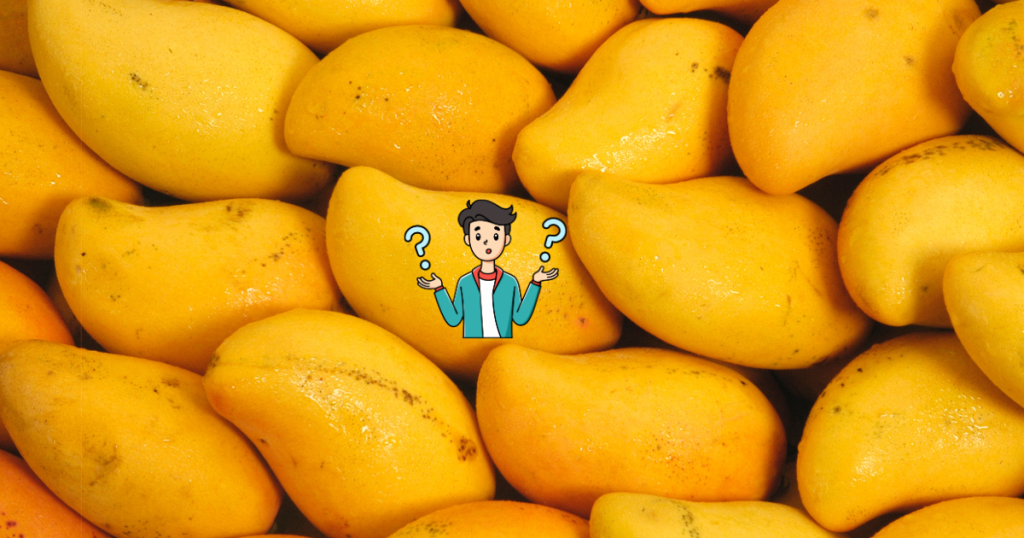
Cats can safely eat mango, but it’s important to follow a few guidelines. Mango should only be given as an occasional treat, not as a regular part of their diet. When offering mango to your cat, give just a tiny piece – a small taste is enough. Make sure to remove the skin and pit before giving any to your cat, as these parts can be dangerous. Only offer the soft, fleshy part of the fruit, cut into small, bite-sized pieces to prevent choking.
After your cat eats mango, keep an eye out for any signs of upset stomach or allergic reactions. It’s crucial to remember that cats don’t actually need fruit in their diet. Their regular cat food provides all the nutrition they require. Some cats may not even like or want to eat mango, which is perfectly normal.
If you’re unsure about giving your cat mango or any new food, it’s always best to consult with your veterinarian first. They can provide personalized advice based on your cat’s specific health needs. In summary, while cats can safely eat small amounts of mango, it’s not necessary for their health and should only be given as an occasional, special treat.
Relevant Article: Can cats eat apples?||
Is mango a healthy treat for cats?
While mango isn’t harmful to cats in small amounts, it’s not necessarily a “healthy” treat for them. Cats are obligate carnivores, which means their bodies are designed to derive nutrition primarily from animal-based proteins. Their digestive systems aren’t well-equipped to process fruits and vegetables efficiently.
Mango does contain some beneficial nutrients like vitamins A and C, but cats can’t utilize these nutrients from plant sources as effectively as humans can. Moreover, mango is high in natural sugars, which aren’t ideal for cats and can potentially lead to weight gain or dental issues if given too frequently.
A more suitable and healthier treat for cats would be small pieces of cooked lean meat or commercially prepared cat treats specifically formulated for feline nutritional needs. These options align better with a cat’s natural diet and provide more appropriate nutrients.
If you do decide to offer mango as an occasional treat, it should be in very small quantities and not replace any part of their regular, balanced diet. Remember, the vast majority of your cat’s nutrition should come from high-quality cat food designed to meet their specific dietary requirements. Always consult with your veterinarian before introducing any new foods into your cat’s diet to ensure it’s appropriate for your individual pet.
Can cats eat mango in moderation?
Yes, cats can eat mango in moderation, but it’s important to emphasize the “moderation” part. Mango should be considered an occasional treat rather than a regular part of a cat’s diet.
When offering mango to your cat, keep these points in mind:
Frequency: Limit mango to a rare treat, perhaps once or twice a month at most.
Portion size: Offer only a small piece, about the size of a blueberry or smaller.
Preparation: Remove the skin and pit, and cut the flesh into tiny, manageable pieces.
Observation: Watch your cat for any signs of digestive upset after eating mango.
While mango isn’t toxic to cats, it’s not a necessary part of their diet. Cats are obligate carnivores, meaning their bodies are designed to process and utilize nutrients from animal sources. They don’t require fruits in their diet, and their digestive systems aren’t optimized to handle large amounts of plant matter or sugar.
Remember, even in moderation, not all cats will enjoy or tolerate mango. Some may show no interest, while others might experience mild digestive issues. If you’re considering introducing mango or any new food to your cat’s diet, it’s always wise to consult with your veterinarian first. They can provide personalized advice based on your cat’s specific health needs and dietary requirements.
Are mangoes good for cats’ digestive health?
Mangoes can be a safe treat for cats in moderation, but they aren’t particularly beneficial for their digestive health. The fruit’s fiber content might aid in digestion, helping to regulate bowel movements, but because mangoes are also high in natural sugars, feeding too much can lead to digestive upset, including diarrhea or an upset stomach.
Additionally, while the occasional small piece of mango can be a fun treat, cats don’t actually need fruit in their diet. They’re obligate carnivores, which means their bodies are designed to get nutrients primarily from meat. The vitamins and minerals in mangoes, such as vitamin C and A, are more beneficial to humans than cats since cats synthesize their own vitamin C and get vitamin A from animal sources.
If you do decide to give your cat mango, make sure it’s ripe, peeled, and free of the seed, as the seed poses a choking hazard and can be harmful if ingested. Always offer mango in very small portions and only as an occasional treat, not as a regular part of their diet. While it’s unlikely to cause harm in small amounts, it’s best to stick to foods specifically formulated for cats to ensure they’re getting the nutrients they need.
Can cats eat mango without the skin?
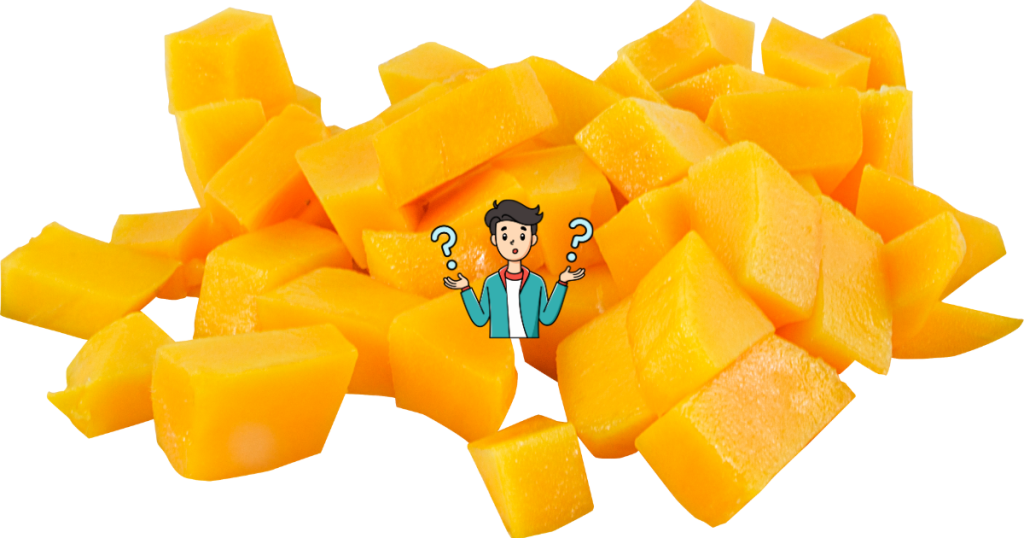
Yes, cats can eat mango as long as the skin is removed, but it’s important to do so in moderation. The skin of the mango is tough, fibrous, and can be difficult for cats to digest, potentially causing gastrointestinal issues or even posing a choking hazard. Therefore, it’s crucial to peel the mango completely before offering any to your cat.
Once the skin is removed, the soft, juicy flesh of the mango is generally safe for cats to eat in small amounts. However, because mango is high in natural sugars, it’s not something that should be given frequently. Cats have different nutritional needs than humans, and their bodies aren’t designed to handle large amounts of sugar. Feeding too much mango could lead to digestive upset, including stomach aches or diarrhea.
If you decide to offer your cat some mango, be sure to cut it into small, bite-sized pieces that are easy for them to chew and swallow. Also, make sure to remove the seed, as it can be a choking hazard and contains compounds that could be harmful if ingested.
While a small piece of mango can make for an interesting and occasionally fun treat, it’s important to remember that cats are obligate carnivores. This means their diet should primarily consist of meat, which provides the essential nutrients they need to thrive. Fruits like mango should only be an occasional treat and not a regular part of their diet, as they don’t provide the necessary nutrition that cats require. It’s always best to stick to foods specifically formulated for cats to ensure they are getting the proper balance of nutrients.
What vitamins and minerals does mango provide for cats?
Mangoes contain a variety of vitamins and minerals, some of which can be beneficial for cats, though their nutritional needs are primarily met through meat. Here’s a breakdown of what mangoes offer:
1. Vitamin A
- Benefits: Essential for maintaining good vision, supporting immune function, and promoting healthy skin and coat.
- Note: Cats already get their necessary vitamin A from animal sources, which is more bioavailable to them than plant-based vitamin A.
2. Vitamin C
- Benefits: An antioxidant that supports the immune system and helps protect cells from damage.
- Note: Cats synthesize their own vitamin C, so they don’t typically need additional amounts from their diet.
3. Vitamin E
- Benefits: An antioxidant that helps protect cells from oxidative damage and supports skin health.
- Note: While beneficial, vitamin E is also found in higher concentrations in meats and cat-specific foods.
4. Vitamin K
- Benefits: Important for blood clotting and bone health.
- Note: Mangoes provide a small amount of vitamin K, but cats usually get enough from their regular diet.
5. Folate (Vitamin B9)
- Benefits: Supports cell function and tissue growth, and plays a role in DNA synthesis.
- Note: Folate is essential for cats, but they typically get it from animal sources in their diet.
6. Potassium
- Benefits: Supports heart function, muscle contraction, and fluid balance.
- Note: Potassium is an important mineral, and while mangoes provide some, cats primarily obtain it from meat sources.
7. Magnesium
- Benefits: Involved in muscle and nerve function, as well as maintaining a steady heartbeat and supporting bone health.
- Note: Magnesium is essential for cats, but they generally get what they need from their meat-based diet.
8. Fiber
- Benefits: Helps with digestion and can aid in preventing constipation.
- Note: The fiber in mangoes can be beneficial in small amounts, but too much can cause digestive upset.
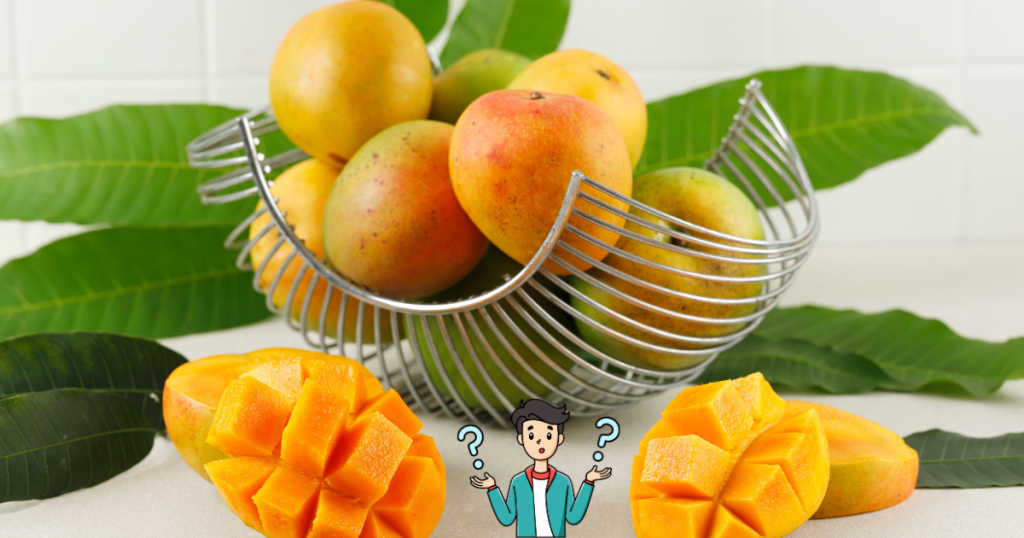
Can mango help with cat weight management?
Mango is not an ideal food for cat weight management. While it contains fiber, which can help with digestion and may contribute to a feeling of fullness, the high sugar content makes it less suitable for cats, especially if weight management is a concern.
Here’s why mango isn’t the best choice for managing a cat’s weight:
1. High Sugar Content
- Mangoes are naturally high in sugar, which can contribute to weight gain rather than weight loss in cats. Cats don’t need sugar in their diet, and consuming too much can lead to obesity, diabetes, and other health issues.
2. Caloric Intake
- Mangoes add extra calories to your cat’s diet, which can hinder weight loss efforts. Cats require a diet that is low in carbohydrates and high in protein, which mangoes do not provide.
3. Lack of Essential Nutrients
- While mangoes do provide some vitamins and minerals, they lack the essential nutrients that cats need from a high-protein, low-carbohydrate diet. For effective weight management, a diet that aligns with a cat’s nutritional needs is crucial.
4. Portion Control
- Even in small amounts, mango should only be given as an occasional treat. Regular feeding of mango or other fruits could lead to an imbalance in your cat’s diet, making weight management more challenging.
5. Better Alternatives
- For weight management, it’s better to focus on high-protein, low-calorie cat foods specifically designed for weight control. These foods are formulated to meet a cat’s nutritional needs while helping them lose or maintain weight.


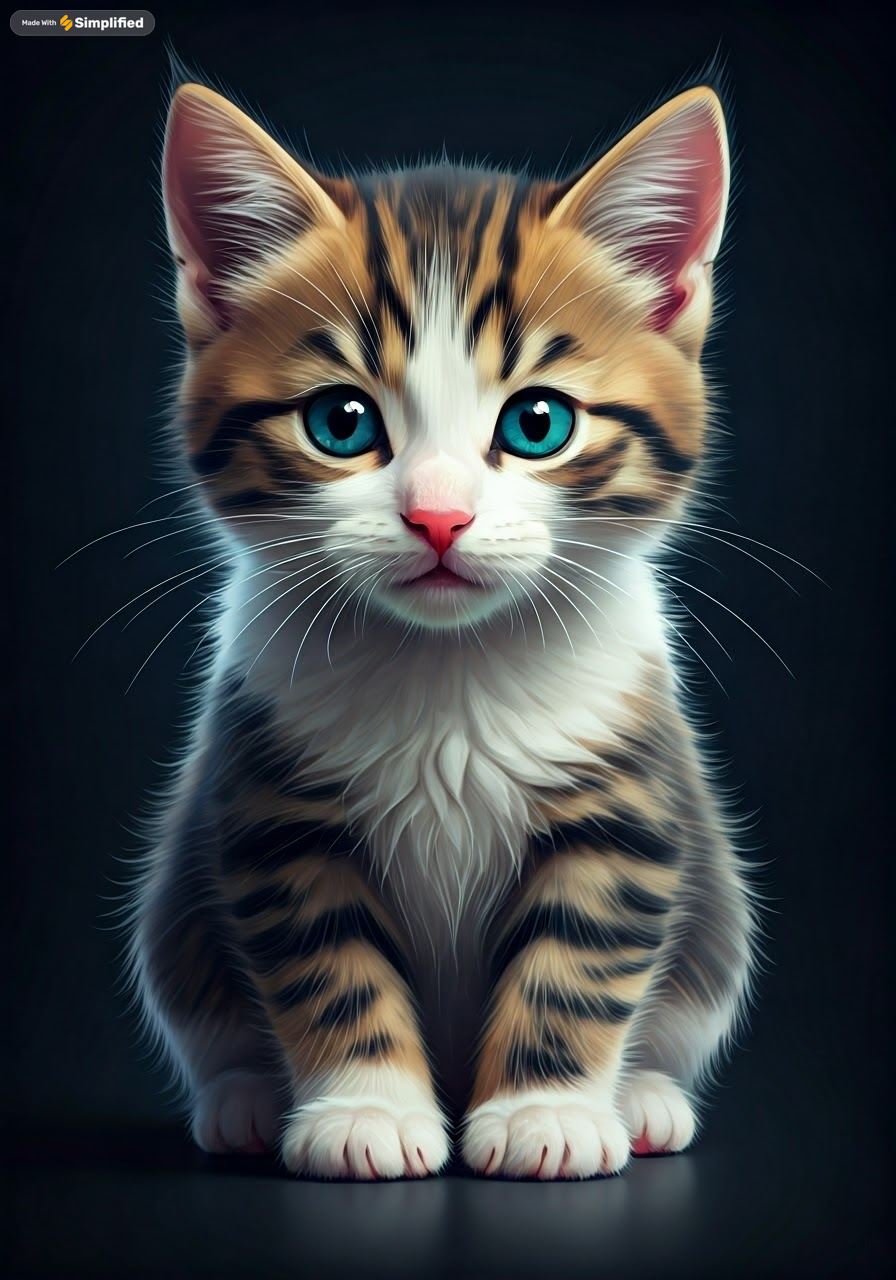
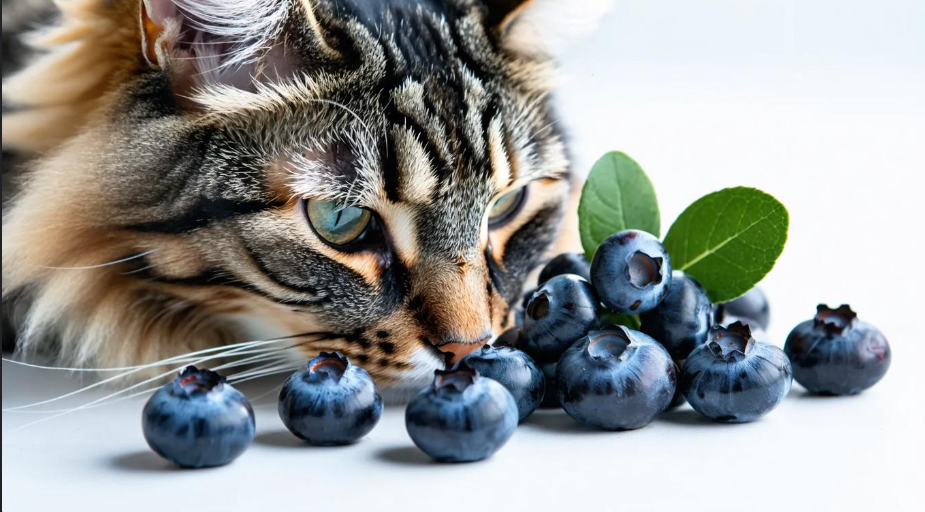


Leave a Reply